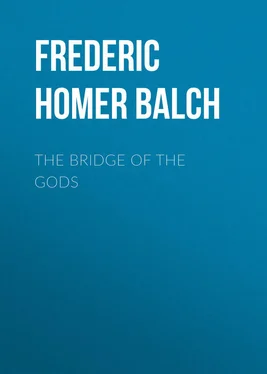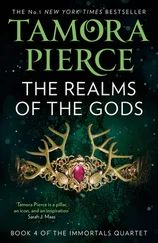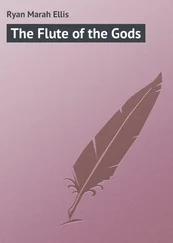Frederic Balch - The Bridge of the Gods
Здесь есть возможность читать онлайн «Frederic Balch - The Bridge of the Gods» — ознакомительный отрывок электронной книги совершенно бесплатно, а после прочтения отрывка купить полную версию. В некоторых случаях можно слушать аудио, скачать через торрент в формате fb2 и присутствует краткое содержание. ISBN: , Жанр: foreign_antique, foreign_prose, на английском языке. Описание произведения, (предисловие) а так же отзывы посетителей доступны на портале библиотеки ЛибКат.
- Название:The Bridge of the Gods
- Автор:
- Жанр:
- Год:неизвестен
- ISBN:http://www.gutenberg.org/ebooks/28815
- Рейтинг книги:3 / 5. Голосов: 1
-
Избранное:Добавить в избранное
- Отзывы:
-
Ваша оценка:
- 60
- 1
- 2
- 3
- 4
- 5
The Bridge of the Gods: краткое содержание, описание и аннотация
Предлагаем к чтению аннотацию, описание, краткое содержание или предисловие (зависит от того, что написал сам автор книги «The Bridge of the Gods»). Если вы не нашли необходимую информацию о книге — напишите в комментариях, мы постараемся отыскать её.
The Bridge of the Gods — читать онлайн ознакомительный отрывок
Ниже представлен текст книги, разбитый по страницам. Система сохранения места последней прочитанной страницы, позволяет с удобством читать онлайн бесплатно книгу «The Bridge of the Gods», без необходимости каждый раз заново искать на чём Вы остановились. Поставьте закладку, и сможете в любой момент перейти на страницу, на которой закончили чтение.
Интервал:
Закладка:
Frederic Homer Balch
The Bridge of the Gods / A Romance of Indian Oregon. 19th Edition
In attempting to present with romantic setting a truthful and realistic picture of the powerful and picturesque Indian tribes that inhabited the Oregon country two centuries ago, the author could not be indifferent to the many serious difficulties inseparable from such an enterprise. Of the literary success with which his work has been accomplished, he must of course leave others to judge; but he may without immodesty speak briefly of his preparation for his task, and of the foundation of some of the facts and legends which form the framework of his story. Indian life and character have long been a favorite study with him, and in these pages he has attempted to describe them, not from an ideal standpoint, but as he knew them in his own boyhood on the Upper Columbia. Many of the incidents related in the story have come under his personal observation; others have been told him by aged pioneers, or gleaned from old books of Northwestern travel. The every-day life of the Indians, their food, their dress, their methods of making their mats, of building their houses, of shaping their canoes, their gambling games, their religious beliefs, their legends, their subjects of conversation, the sports and pastimes of their children, – all these have been studied at first hand, and with the advantages of familiar and friendly intercourse with these people in their own homes. By constant questioning, many facts have been gained regarding their ancestry, and the fragments of history, tradition, and legend that have come down from them. Indian antiquities have been studied through every available source of information. All the antiquarian collections in Oregon and California have been consulted, old trading-posts visited, and old pioneers and early missionaries conversed with. Nothing has been discarded as trivial or insignificant that could aid in the slightest degree in affording an insight into Indian character and customs of a by-gone age.
As to the great Confederacy of the Wauna, it may be said that Gray’s “History of Oregon” tells us of an alliance of several tribes on the Upper Columbia for mutual protection and defence; and students of Northwestern history will recall the great confederacy that the Yakima war-chief Kamyakin formed against the whites in the war of 1856, when the Indian tribes were in revolt from the British Possessions to the California line. Signal-fires announcing war against the whites leaped from hill to hill, flashing out in the night, till the line of fire beginning at the wild Okanogan ended a thousand miles south, on the foot-hills of Mount Shasta. Knowing such a confederacy as this to be an historical fact, there seems nothing improbable in that part of the legend which tells us that in ancient times the Indian tribes on either side of the Cascade Range united under the great war-chief Multnomah against their hereditary foes the Shoshones. Even this would not be so extensive a confederacy as that which Kamyakin formed a hundred and fifty years later.
It may be asked if there was ever a great natural bridge over the Columbia, – a “Bridge of the Gods,” such as the legend describes. The answer is emphatically, “Yes.” Everywhere along the mid-Columbia the Indians tell of a great bridge that once spanned the river where the cascades now are, but where at that time the placid current flowed under an arch of stone; that this bridge was tomanowos , built by the gods; that the Great Spirit shook the earth, and the bridge crashed down into the river, forming the present obstruction of the cascades. All of the Columbian tribes tell this story, in different versions and in different dialects, but all agreeing upon its essential features as one of the great facts of their past history.
“ Ancutta (long time back),” say the Tumwater Indians, “the salmon he no pass Tumwater falls. It too much big leap. Snake Indian he no catch um fish above falls. By and by great tomanowos bridge at cascades he fall in, dam up water, make river higher all way up to Tumwater; then salmon he get over. Then Snake Indian all time catch um plenty.”
“My father talk one time,” said an old Klickitat to a pioneer at White Salmon, Washington; “long time ago liddle boy, him in canoe, his mother paddle, paddle up Columbia, then come to tomanowos bridge. Squaw paddle canoe under; all dark under bridge. He look up, all like one big roof, shut out sky, no see um sun. Indian afraid, paddle quick, get past soon, no good. Liddle boy no forget how bridge look.”
Local proof also is not wanting. In the fall, when the freshets are over and the waters of the Columbia are clear, one going out in a small boat just above the cascades and looking down into the transparent depths can see submerged forest trees beneath him, still standing upright as they stood before the bridge fell in and the river was raised above them. It is a strange, weird sight, this forest beneath the river; the waters wash over the broken tree-tops, fish swim among the leafless branches: it is desolate, spectre-like, beyond all words. Scientific men who have examined the field with a view to determining the credibility of the legend about the bridge are convinced that it is essentially true. Believed in by many tribes, attested by the appearance of the locality, and confirmed by geological investigation, it is surely entitled to be received as a historic fact.
The shipwreck of an Oriental vessel on the Oregon coast, which furnishes one of the most romantic elements in our story, is an altogether probable historic incident, as explained more fully in a foot-note on page 75. Конец ознакомительного фрагмента. Текст предоставлен ООО «ЛитРес». Прочитайте эту книгу целиком, купив полную легальную версию на ЛитРес. Безопасно оплатить книгу можно банковской картой Visa, MasterCard, Maestro, со счета мобильного телефона, с платежного терминала, в салоне МТС или Связной, через PayPal, WebMoney, Яндекс.Деньги, QIWI Кошелек, бонусными картами или другим удобным Вам способом.
The spelling of Indian names, in which authorities differ so widely, has been made as accurate as possible; and, as in the name “Wallulah,” the oldest and most Indian-like form has been chosen. An exception has been made in the case of the modernized and corrupted “Willamette,” which is used instead of the original Indian name, “Wallamet.” But the meaningless “Willamette” has unfortunately passed into such general use that one is almost compelled to accept it. Another verbal irregularity should be noticed: Wauna, the name given by all the Indians in the story to the Columbia, was only the Klickitat name for it. The Indians had no general name for the Columbia, but each tribe had a special name, if any, for it. Some had no name for it at all. It was simply “the big water,” “ the river,” “the big salmon water.” What Wauna, the Klickitat name, or Wemath, the Wasco name, signifies, the author has been unable to learn, even from the Indians who gave him the names. They do not know; they say their fathers knew, but it is forgotten now.
A rich and splendid treasure of legend and lore has passed away with the old pioneers and the Indians of the earlier generation. All that may be found interesting in this or any other book on the Indians, compared to what has been lost, is like “a torn leaf from some old romance.”
F. H. B.Oakland, California,
September, 1890.
Читать дальшеИнтервал:
Закладка:
Похожие книги на «The Bridge of the Gods»
Представляем Вашему вниманию похожие книги на «The Bridge of the Gods» списком для выбора. Мы отобрали схожую по названию и смыслу литературу в надежде предоставить читателям больше вариантов отыскать новые, интересные, ещё непрочитанные произведения.
Обсуждение, отзывы о книге «The Bridge of the Gods» и просто собственные мнения читателей. Оставьте ваши комментарии, напишите, что Вы думаете о произведении, его смысле или главных героях. Укажите что конкретно понравилось, а что нет, и почему Вы так считаете.












